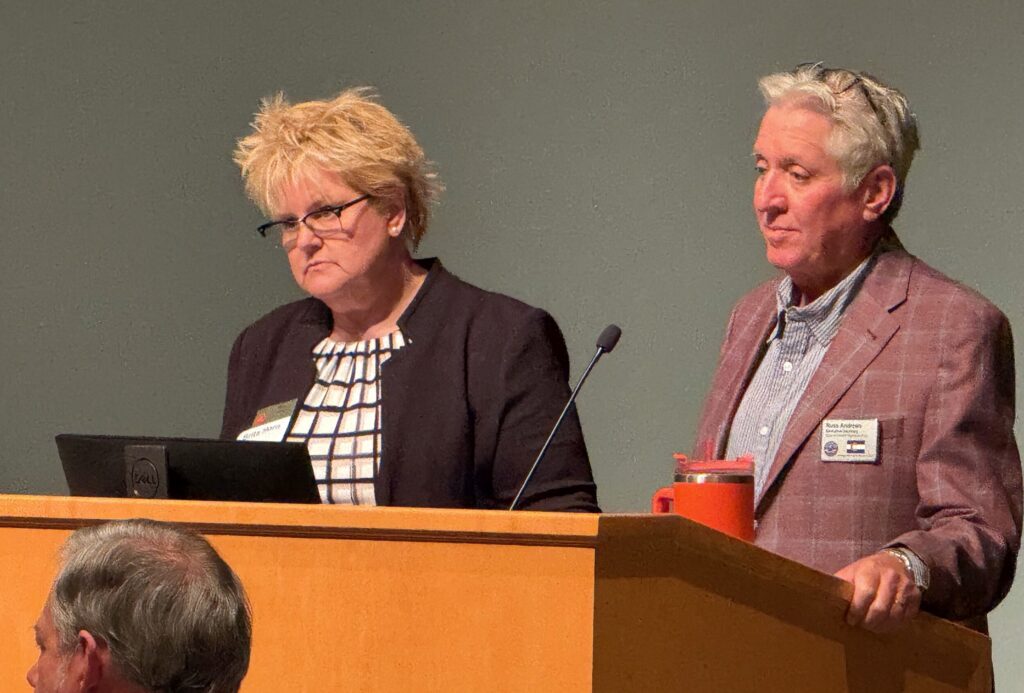Arizona, Nevada and Mexico will again get less Colorado River water in 2026 | OUT WEST ROUNDUP

Lower Basin to get less Colorado River water
DENVER — Arizona, Nevada and Mexico will again live with less water from the Colorado River as drought lingers in the West, federal officials announced Aug. 15.
The Colorado River is a critical lifeline to seven U.S. states, 30 Native American tribes, and two Mexican states. The cuts are based on projections for levels at federal reservoirs — chief among them Lake Powell and Lake Mead — released every August by the U.S. Bureau of Reclamation.
Arizona will again go without 18% of its total Colorado River allocation, while Mexico loses 5%. The reduction for Nevada — which receives far less water than Arizona, California or Mexico — will stay at 7%. California won’t face any cuts because it has senior water rights and is the last to lose in times of shortage.
Low reservoir levels at Lake Mead have triggered mandatory cutbacks every year since 2022, with the deepest cuts in 2023, which hit farmers in Arizona the hardest.
The Trump administration gave a mid-November deadline for states to reach a preliminary agreement, or risk federal intervention. Negotiations have faced delays as states push back against how much water they should each give up.
The original 1922 Colorado River Compact was calculated based on an amount of water that doesn’t exist in today’s climate. That leaves the Upper Basin states of New Mexico, Colorado, Wyoming and Utah to share far less water after the required amount is sent to the to the “Lower Basin” states of Nevada, Arizona and California.
States are considering a so-called natural flow approach to managing the river — where the Lower Basin would receive a certain percentage of the average natural flow from the prior few years.
WYOMING
Rabies risk from park’s bat-infested cabins
Health officials are working to alert hundreds of people in dozens of states and several countries who may have been exposed to rabies in bat-infested cabins in Wyoming’s Grand Teton National Park over the past few months.
As of Aug. 15, none of the bats found in some of the eight linked cabins at Jackson Lake Lodge had tested positive for rabies.
But the handful of dead bats found and sent to the Wyoming State Veterinary Laboratory in Laramie for testing were probably only a small sample of the likely dozens that colonized the attic above the row of cabins, Wyoming State Health Officer Dr. Alexia Harrist said.
Other bats weren’t killed but got shooed out through cabin doors and windows. Meanwhile, the vast majority never flapped down from the attic into living spaces.
Health officials thus deemed it better safe than sorry to alert everybody who has stayed in the cabins recently that they might have been exposed by being bitten or scratched. Especially when people are sleeping, a bat bite or scratch can go unseen and unnoticed.
The cabins have been unoccupied, with no plans to reopen, since discovery of the bat problem July 27.
The cabins opened for the summer season in May after being vacant over the winter. Based on the roughly 250 reservations through late July, health officials estimated that up to 500 people had stayed in the cabins.
Health officials were recommending prophylactic shots for people who fit certain criteria, such as deep sleepers who found a bat in their room, and children too young to say that they had seen a bat.
NEW MEXICO
Ex-candidates gets 80 years for shootings
ALBUQUERQUE — A failed political candidate was sentenced to 80 years in federal prison on Aug. 13 for his convictions in a series of drive-by shootings at the homes of state and local lawmakers in the aftermath of the 2020 election.
A jury convicted former Republican candidate Solomon Peña earlier this year of conspiracy, weapons and other charges in the shootings in December 2022 and January 2023 on the homes of four Democratic officials in Albuquerque, including the current state House speaker.
Prosecutors, who had sought a 90-year sentence, said Peña has shown no remorse and had hoped to cause political change by terrorizing people who held contrary views to him into being too afraid to take part in political life.
Peña’s lawyers had sought a 60-year sentence, saying their client maintains that he is innocent of the charges. Peña plans to appeal, they said.
Prosecutors said Peña resorted to violence in the belief that a “rigged” election had robbed him of victory in his bid to serve in the state legislature.
The shootings targeted the homes of officials including two county commissioners after their certification of the 2022 election, in which Peña lost by nearly 50 percentage points. No one was injured, but in one case bullets passed through the bedroom of a state senator’s 10-year-old daughter.
MONTANA
GOP lawmakers sue state party
Republican legislators disenfranchised at the June Montana GOP officers’ convention are asking a judge to restore their voting privileges and force a new election for party leadership.
State senators Jason Ellsworth, Denley Loge and Shelley Vanceweren’t allowed to vote for Montana Republican Party leadership at the June 28 convention in Helena, where a new party Chair Art Wittich and Vice Chair Stacy Zinn were elected.
Ellsworth, of Hamilton; Loge, of St. Regis; and Vance, of Belgrade; say they’re being canceled for supporting policies endorsed by Republican Gov. Greg Gianforte. All three lawmakers belonged to a minority of Senate Republicans who led an effort to, among other things, renew the state’s expanded Medicaid program and back Gianforte’s preferred approach to lowering property taxes on primary residences instead of other options supported by hardline Republicans.
At the convention, members of the hard-right Freedom Caucus, a political action committee, called for the three senators to not be recognized. A caucus member made the motion, which then-state party chair Don Kaltschmidt called out of order. Then, another Freedom Caucus member called on convention delegates to disregard the party chair’s ruling, which they did.
Ellsworth, Loge and Vance, who were invited to the convention as Republican legislators and paid for admission, were told to leave.
The lawsuit filed in Lewis and Clark District Court asks for a legal determination of what the lawmakers’ rights are. The Montana Constitution grants legislators absolute immunity for legislative actions, which the plaintiffs argue should have prevented their disenfranchisement and earlier censuring by the Montana Republican Party executive board.













